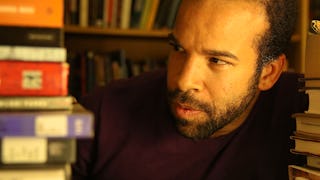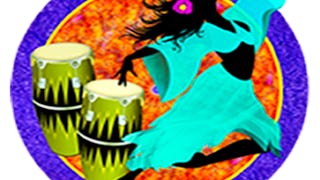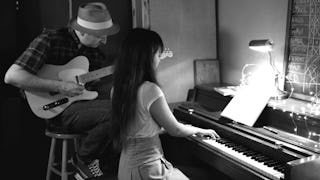The Psalms offer a path to express a range of human emotion and to encounter God in a new way. In times of great joy or deep grief, how might the Psalms help shape who we are – and who we are to one another?



What you'll learn
Meditate on psalms and artworks in your personal spiritual life.
Explore interpretations of the Psalms through the arts.
Examine the role and purpose of the Psalms for your community of worship.
Details to know

Add to your LinkedIn profile
February 2025
6 assignments
See how employees at top companies are mastering in-demand skills


Earn a career certificate
Add this credential to your LinkedIn profile, resume, or CV
Share it on social media and in your performance review

There are 5 modules in this course
What does it mean for individuals to praise God? We will examine this crucial question by tracing individuals’ journeys from encountering God to glorifying God. To do so, you will first reflect on times in your personal life when you have encountered and praised God. Then you will meditate on Psalm 19, a psalm of praise, using the lectio divina spiritual practice. After this meditation, you will engage with artful interpretations of Psalm 19 in two ways: 1) watching a video of poet and theologian Malcolm Guite reading and commenting on his poem about Psalm 19; and 2) viewing an illuminated manuscript painting of Psalm 19 by visual artist Debra Band and listening to her commentary on it. Finally, you will reflect on how this session has affected your interpretation of psalms of praise.
What's included
3 videos13 readings2 assignments2 discussion prompts
What does it mean for individuals to lament before God? You will examine this crucial question by tracing individuals’ journeys from encountering hardship to crying out to God in faith. To do so, you will explore the psalms of lament. First, you will meditate on Psalm 22, a psalm of lament, using the lectio divina spiritual practice. Then you will explore two artistic interpretations of Psalm 22, one performed by dancer Paiter van Yperen and another performed by priest and theologian Ellen Davis. Finally, you will reflect on how your engagement with Psalm 22 has affected your interpretation of psalms of lament.
What's included
1 video7 readings1 assignment1 discussion prompt
What do you do when your pain or suffering remains unresolved? You will examine this crucial question by diving deeper into the psalms of lament, tracing the ways that individuals with unresolved or ongoing suffering bring their pain to their communities. To do so, you will meditate on Psalm 88, a lament psalm that resists easy resolution. Then, you will explore two artistic interpretations of Psalm 88, performed by musician Charles Pettee and watercolor artist Julia Hendrickson, respectively. Finally, you will listen to commentary on the psalm from Rabbi Dorothy Richman and reflect on the role of psalms of lament within worshiping communities.
What's included
1 video8 readings1 assignment1 discussion prompt
What does it mean for communities to lament before God? We now turn to examining how worshiping communities themselves encounter pain and sing their cries to God in love. Put another way, we will ask: What is the theological witness to communal lament? First, you will meditate on Psalm 137, a communal psalm of lament written during Israel’s exile in Babylon. Then you will explore a musical interpretation of the psalm performed by Joey Weisenberg and the Hadar Ensemble, followed by commentary by Rabbi Richman. Finally, you will reflect on the role and purpose of the psalms of lament in your own worshiping community.
What's included
1 video5 readings1 assignment1 discussion prompt
What does it mean for communities to praise God? In our final session in this course, we examine this crucial question by tracing how worshiping communities encountering joy and pain can sing praise to God in hope. To do so, you will first explore a painting based on Psalm 46 by artist and theologian Makoto Fujimura. Then you will engage with Psalm 46 in two ways: 1) meditating on the psalm using the lectio divina spiritual practice, and 2) viewing commentary on the psalm by Makoto Fujimura. Finally, you will reflect on the role and purpose of psalms of praise for worshiping communities, and reflect on what you have learned in this course.
What's included
5 readings1 assignment2 discussion prompts
Instructor

Offered by
Recommended if you're interested in Music and Art

Hebrew University of Jerusalem

California Institute of the Arts

University of Florida
Why people choose Coursera for their career





Open new doors with Coursera Plus
Unlimited access to 10,000+ world-class courses, hands-on projects, and job-ready certificate programs - all included in your subscription
Advance your career with an online degree
Earn a degree from world-class universities - 100% online
Join over 3,400 global companies that choose Coursera for Business
Upskill your employees to excel in the digital economy
Frequently asked questions
Access to lectures and assignments depends on your type of enrollment. If you take a course in audit mode, you will be able to see most course materials for free. To access graded assignments and to earn a Certificate, you will need to purchase the Certificate experience, during or after your audit. If you don't see the audit option:
The course may not offer an audit option. You can try a Free Trial instead, or apply for Financial Aid.
The course may offer 'Full Course, No Certificate' instead. This option lets you see all course materials, submit required assessments, and get a final grade. This also means that you will not be able to purchase a Certificate experience.
When you purchase a Certificate you get access to all course materials, including graded assignments. Upon completing the course, your electronic Certificate will be added to your Accomplishments page - from there, you can print your Certificate or add it to your LinkedIn profile. If you only want to read and view the course content, you can audit the course for free.
You will be eligible for a full refund until two weeks after your payment date, or (for courses that have just launched) until two weeks after the first session of the course begins, whichever is later. You cannot receive a refund once you’ve earned a Course Certificate, even if you complete the course within the two-week refund period. See our full refund policy.
More questions
Financial aid available,



